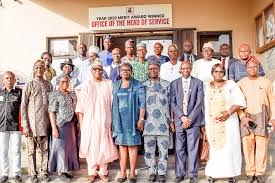The All Nigeria Confederation of Principals of Secondary Schools (ANCOPSS) recently held its annual general meeting and induction ceremony for newly appointed principals. The event brought together educational leaders from across the state to celebrate the achievements of these new principals and set expectations for their roles.

During the induction ceremony, Mr. Tayo Shofoluye, Principal of Ojoku Junior High School, Tolu Complex, Apapa, Ajegunle, addressed the inductees, expressing confidence in their abilities and highlighting the importance of being law-abiding.
He emphasized the need for the newly appointed principals to adhere to the ethics and regulations of the teaching profession, thereby ensuring that they lead by example and do the right thing at all times. Shofoluye stressed the significance of leadership, teamwork, and treating both staff and students with respect and care.
Moreover, he encouraged the principals to foster cordial relationships with their communities, including leaders, parents, and other stakeholders, assuring them that they would not encounter any problems if they embrace these principles.
Anike Adeponye, the Tutor General/Permanent Secretary of Education District 2, expressed gratitude to Governor Babajide Olusola Sanwo-Olu for approving the appointments. She also acknowledged the support of Mr. Jamiu Ali Balogun, the Commissioner for Basic and Secondary Education in Lagos State, and other stakeholders.
Adeponye advised the newly appointed principals to familiarize themselves with the laws and regulations outlined in the public service booklet. Furthermore, she urged them to operate with a fear of God and ensure fairness to the governor, commissioner, Tutor General/Permanent Secretary, parents, and students.
Mr. Olushola Maseyi, the President of ANCOPSS Lagos State, emphasized the importance of learning and experience in the role of a principal. He noted that being a principal requires understanding the ethics and ethos of the profession, and acquiring the necessary skills through on-the-job training.
Maseyi highlighted the value of the training provided at the induction, stating that it would improve the attitudes and responses of the newly appointed principals to issues in their schools. He expressed confidence that this would contribute to the betterment of education in Lagos State.
Dr. Maria Eko, Chairperson of the Induction Committee and Principal of Vetland Senior Grammar School, Oko Oba, Agege, elaborated on the qualities expected of a principal. She emphasized the need for principals to be resourceful, creative, innovative, and capable of thinking outside the box.
As 21st-century leaders, they should be able to work under pressure and strive for results that reflect the investment Lagos State has made in education. Dr. Eko expressed optimism that the newly appointed principals possess these qualities and are up to the task.
In response to the training, Mrs. Tade Taiwo, Principal of Oke Afa Junior College, Isolo, shared her insights, stating that as a dynamic principal, she needs to be adaptable and able to lead students, teachers, and the community. She emphasized the importance of adjusting to the ever-changing environment and being responsive to the needs of those she serves.
The induction ceremony and the guidance provided by experienced educational leaders underscore the significance of effective leadership in secondary schools. By upholding the principles of respect, fairness, and community engagement, these newly appointed principals have the opportunity to make a positive impact on their schools and contribute to the overall development of education in Lagos State.
While the induction of new principals is a cause for celebration, it’s important to acknowledge the systemic challenges they may face in their roles. Principals in Nigeria often grapple with limited resources, overcrowded classrooms, and inadequate infrastructure. Additionally, they may encounter bureaucratic hurdles that hinder their ability to implement necessary changes.
To truly empower new principals, it is crucial for the government and education authorities to address these challenges. Adequate funding, improved infrastructure, and supportive policies are essential to create an environment where principals can thrive and make a meaningful impact on the education system. Moreover, ongoing professional development and mentorship programs can help principals navigate the complexities of their roles and enhance their leadership skills.
While the induction ceremony highlights the expectations placed on principals, it is equally important for stakeholders to recognize and address the systemic obstacles that may impede their success. By providing the necessary resources and support, Nigeria can create a conducive environment for principals to effectively lead and drive positive change in secondary schools.



